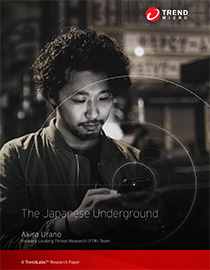The Japanese Underground: Japan's Unique Cybercriminal Economy
 View research paper: The Japanese Underground
View research paper: The Japanese Underground
Even in Japan, where daily life is guided by law, discipline, and traditions, cybercrime rears its ugly head.
Imagine a young man, 17 years of age. Imagine him being arrested for several cases of ransomware distribution, attempted hacking, and credit-card fraud. His toolbox of choice: one of the many Japanese message boards that cater to such shady activities, platforms that enable like-minded individuals to not only dabble in cybercrime, but also use it to make a living.
This isn't just fantasy. It's a reality in the Japanese underground, where private and cloistered online communities protect cybercriminals by way of forced anonymity and stringent gatekeeping.
This report offers a detailed look into the growing Japanese underground, its marketplaces, and its economy. It discusses the cybercriminal underground bred by Japan’s strict legislation and overall approach to tackling crime, and how the country’s hard-coded culture of contrasts has made this specific cybercriminal underground one of the most unique that we’ve ever had the opportunity to explore.
The report tackles everything we’ve discovered about the Japanese underground, from its criminal activities and its illicit services to the traits and idiosyncrasies that distinguish it from those we’ve covered before. It also covers how forced online anonymity—a trend that Japan started with its public message boards—is also helping this particular underground economy flourish.
Some key highlights of this paper:
- The gatekeeping measures Japanese cybercriminals take to ensure that only those ‘in the know’ can access their sites and wares
- The increasing usage of the deep web to conceal illegal activity
- The Japanese Cybercriminal Underground’s preference for trading Playstation™ Store currency as well as Amazon™ Gift Cards, rather than using traditional currency
- The kind of illegal contraband and paraphernalia prevalent in the Japanese cybercriminal underground in contrast to the country’s strict laws, namely: drugs, child pornography, and high-caliber weaponry
- The pricing of certain cybercriminal underground staples, such as cloned and/or compromised credit cards, Paypal™ bank accounts and fake passports. The latter in particular is sold cheaply compared to other sites in the deep web – US$700 for a US passport from Japanese cybercriminals, compared to US$5900 from other sources.
View more details in the full report, The Japanese Underground.
Like it? Add this infographic to your site:
1. Click on the box below. 2. Press Ctrl+A to select all. 3. Press Ctrl+C to copy. 4. Paste the code into your page (Ctrl+V).
Image will appear the same size as you see above.
Recent Posts
- Estimating Future Risk Outbreaks at Scale in Real-World Deployments
- The Next Phase of Cybercrime: Agentic AI and the Shift to Autonomous Criminal Operations
- Reimagining Fraud Operations: The Rise of AI-Powered Scam Assembly Lines
- The Devil Reviews Xanthorox: A Criminal-Focused Analysis of the Latest Malicious LLM Offering
- AI Security Starts Here: The Essentials for Every Organization

 Complexity and Visibility Gaps in Power Automate
Complexity and Visibility Gaps in Power Automate AI Security Starts Here: The Essentials for Every Organization
AI Security Starts Here: The Essentials for Every Organization The AI-fication of Cyberthreats: Trend Micro Security Predictions for 2026
The AI-fication of Cyberthreats: Trend Micro Security Predictions for 2026 Stay Ahead of AI Threats: Secure LLM Applications With Trend Vision One
Stay Ahead of AI Threats: Secure LLM Applications With Trend Vision One